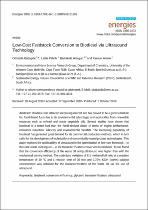JavaScript is disabled for your browser. Some features of this site may not work without it.
- ResearchSpace
- →
- Research Publications/Outputs
- →
- Journal Articles
- →
- View Item
| dc.contributor.author |
Babajide, O

|
|
| dc.contributor.author |
Petrik, L

|
|
| dc.contributor.author |
Amigun, B

|
|
| dc.contributor.author |
Ameer, F

|
|
| dc.date.accessioned | 2010-12-06T13:20:03Z | |
| dc.date.available | 2010-12-06T13:20:03Z | |
| dc.date.issued | 2010-10 | |
| dc.identifier.citation | Babajide, O, Petrik, L, Amigun, B and Ameer, F. 2010. Low-Cost feedstock conversion to biodiesel via ultrasound technology. Energies, Vol. 3(10), pp 1639-1703 | en |
| dc.identifier.issn | 1996-1073 | |
| dc.identifier.uri | http://www.mdpi.com/1996-1073/3/10/1691/pdf | |
| dc.identifier.uri | http://hdl.handle.net/10204/4604 | |
| dc.description | Copyright: 2010 MDPI Publishing (Basel, Switzerland) | en |
| dc.description.abstract | Biodiesel has attracted increasing interest and has proved to be a good substitute for fossil-based fuels due to its environmental advantages and availability from renewable resources such as refined and waste vegetable oils. Several studies have shown that biodiesel is a better fuel than the fossil-derived diesel in terms of engine performance, emissions reduction, lubricity and environmental benefits. The increasing popularity of biodiesel has generated great demand for its commercial production methods, which in turn calls for the development of technically and economically sound process technologies. This paper explores the applicability of ultrasound in the optimization of low-cost feedstock – in this case waste cooking oil – in the transesterification conversion to biodiesel. It was found that the conversion efficiency of the waste oil using ultrasound was higher than with the mechanical stirring method. The optimized variables of 6:1 methanol/oil ratio at a reaction temperature of 30 °C and a reaction time of 30 min and 0.75% KOH (wt/wt) catalyst concentration was obtained for the transesterification of the waste oil via the use of ultrasound. | en |
| dc.language.iso | en | en |
| dc.publisher | MDPI AG | en |
| dc.relation.ispartofseries | Journal Article | en |
| dc.subject | Biodiesel | en |
| dc.subject | Fossil-based fuels | en |
| dc.subject | Renewable resources | en |
| dc.subject | Vegetable oils | en |
| dc.subject | Ultrasound technology | en |
| dc.subject | Energies | en |
| dc.title | Low-Cost feedstock conversion to biodiesel via ultrasound technology | en |
| dc.type | Article | en |
| dc.identifier.apacitation | Babajide, O., Petrik, L., Amigun, B., & Ameer, F. (2010). Low-Cost feedstock conversion to biodiesel via ultrasound technology. http://hdl.handle.net/10204/4604 | en_ZA |
| dc.identifier.chicagocitation | Babajide, O, L Petrik, B Amigun, and F Ameer "Low-Cost feedstock conversion to biodiesel via ultrasound technology." (2010) http://hdl.handle.net/10204/4604 | en_ZA |
| dc.identifier.vancouvercitation | Babajide O, Petrik L, Amigun B, Ameer F. Low-Cost feedstock conversion to biodiesel via ultrasound technology. 2010; http://hdl.handle.net/10204/4604. | en_ZA |
| dc.identifier.ris | TY - Article AU - Babajide, O AU - Petrik, L AU - Amigun, B AU - Ameer, F AB - Biodiesel has attracted increasing interest and has proved to be a good substitute for fossil-based fuels due to its environmental advantages and availability from renewable resources such as refined and waste vegetable oils. Several studies have shown that biodiesel is a better fuel than the fossil-derived diesel in terms of engine performance, emissions reduction, lubricity and environmental benefits. The increasing popularity of biodiesel has generated great demand for its commercial production methods, which in turn calls for the development of technically and economically sound process technologies. This paper explores the applicability of ultrasound in the optimization of low-cost feedstock – in this case waste cooking oil – in the transesterification conversion to biodiesel. It was found that the conversion efficiency of the waste oil using ultrasound was higher than with the mechanical stirring method. The optimized variables of 6:1 methanol/oil ratio at a reaction temperature of 30 °C and a reaction time of 30 min and 0.75% KOH (wt/wt) catalyst concentration was obtained for the transesterification of the waste oil via the use of ultrasound. DA - 2010-10 DB - ResearchSpace DP - CSIR KW - Biodiesel KW - Fossil-based fuels KW - Renewable resources KW - Vegetable oils KW - Ultrasound technology KW - Energies LK - https://researchspace.csir.co.za PY - 2010 SM - 1996-1073 T1 - Low-Cost feedstock conversion to biodiesel via ultrasound technology TI - Low-Cost feedstock conversion to biodiesel via ultrasound technology UR - http://hdl.handle.net/10204/4604 ER - | en_ZA |






